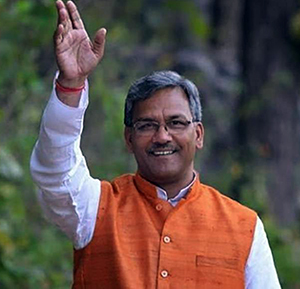Dehradun, Mar 17: Trivendra Singh Rawat was today unanimously elected the leader of Uttarakhand BJP legislature party, paving the way for the former RSS man's swearing in tomorrow as the new Chief Minister of the state.

Announcing this after the legislature party meeting at a hotel here, BJP'scentral observer for the election Narendra Singh Tomar said Rawat's name was proposed by Prakash Pant and Satpal Maharaj, MLAs from Pithoragarh and Chaubattakhal respectively, and byseconded by a host of other legislators.
Satpal Mahraj, a former Union minister and one of the proposers, was among the contenders for the top job.
Soon after the legislature party meeting, the MLAs left for Raj Bhawan where they will hand over the resolution on Rawat's unanimous eletion to Governor K K Paul.
Rawat will be sworn-in as the eighth Chief Minister of the hill state tomorrow at the Parade Ground here in the presence of Prime Minister Narendra Modi and BJP chief Amit Shah, besides a host of national and state party leaders.
Soon after the meeting was over, incharge of the party's affairs in the state Shyam Jaju described Rawat as the most suitable choice for the new responsibility since he was a leader who had both organisational and ministerial experience having served as BJP's organisation secretary and a minister.
"Trivendra Singh Rawat is a leader who has both organisational and ministerial experience. He is perfectly equipped to give the state the kind of leadership it needs, " Jaju said.
Rawat emerged as the party's choice for the top office beating stiff competition from contenders like Prakash Pant and Satpal Maharaj.
The past six days after March 11, when the party swept to a landslide victory in the state winning 57 out of 70 seats, witnessed intense speculation over who would be the new Chief Minister with over half a dozen heavyweight contenders, including as many as three former CMs.
After his election as the legislature party leader, Rawat promised to work towards Prime Minister Narendra Modi's goal of eliminating corruption and poverty.
"Providing people of the state with a corruption free government and bringing about a major change in the lives of the poorest of the poor as targeted by the Prime Minister will be our priority," he told reporters.
The political acumen and organisational skills of Rawat (56) were evident in the manner he guided the party to an impressive win in the Jharkhand assembly elections in 2014 as BJP in-charge of the state.
His RSS background also appeared to have stood him in good stead and helped him enjoy the trust of the BJP leadership.
The third-term MLA from Doiwala seat in Pauri Garhwal district, is also known for his fierce loyalty to the BJP and has never shifted allegiance to any other party.
While stumping for him, Union Home Minister Rajnath Singh reminded the voters "Trivendra Singh Rawat ne kabhi apni nishtha nahin badli (Rawat never switched his loyalty)".
Chaired by Pradesh BJP president Ajay Bhatt, the legislature party meeting was attended by all the newly elected MLAs, all five party MPs, central observers Narendra Singh Tomar and Saroj Pandey, besides in-charge of party's affairs in the state Shyam Jaju, and Union Petroleum Minister and party's election incharge for the state Dharmendra Pradhan.







Comments
Add new comment